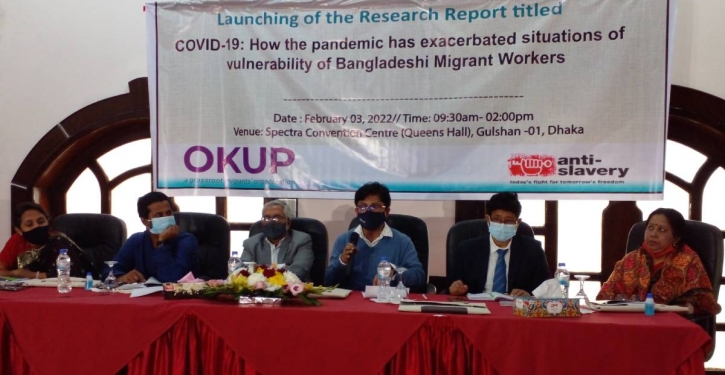Aspiring migrants warned not to deal with middlemen for Malaysia jobs
BI Report || BusinessInsider

Photo: Business Insider Bangladesh
Hopeful migrant workers should not make any financial transaction or pay recruiting agencies and brokers for any job in Malaysia as the government is yet to receive job demands from the host country, said senior government officials on Thursday.
The officials issued the warning at the launching event of the report on “COVID 19 - How the pandemic had exacerbated vulnerabilities for Bangladeshi Migrant workers,” at the Spectra Convention Centre in Dhaka.
Ovibashi Karmi Unnayan Program (OKUP), with the support of Anti-Slavery International, conducted the research.
The report explored the experiences of Bangladeshi migrant workers who came across insecurity and uncertainty in relation to overseas employment caused by the Covid-19 pandemic.
At the event, Md Shahidul Alam, director general of the Bureau of Manpower, Employment and Training (BMET), said, “People will be informed about the recruitment process for Malaysia through newspaper advertisements on time.”
The recruitment of workers for Malaysia may start in late February or early March, he informed.
“However, we have not yet received any demand for jobs from Malaysia, thus, can not announce an exact date for the recruitment process to start,” he added.
Once the job demands are received, it will take two or three months to start sending workers to Malaysia, Shahidul Alam said.
The BMET DG, who was speaking at the occasion as chief guest, alerted people wishing to work in Malaysia by saying that they must be careful of middlemen or brokers who offer Malaysian jobs and ask for money.
He also reiterated the government’s commitment to ensure a minimum cost for migrant workers heading to Malaysia so that they could earn more from the destination country.
On December 19, a new Memorandum of Understanding (MoU) was signed between Bangladesh and Malaysia for the recruitment of Bangladeshi workers as Malaysia has reopened its labour market to Bangladesh after three years.
The research found that in the wake of the Covid-19 pandemic, pre-existing problems with international labour migration practice in Bangladesh intensified the risks of abuse, exploitation, forced labour and other forms of modern-day slavery among migrant workers.
“As a consequence of job loss,” the report said, “Employment insecurity and lack of social protection, migrant workers and their families exhausted their savings to meet their immediate needs and have been forced to take out loans. Migrant workers who incurred large debt to facilitate their migration cost have been unable to repay those loans, putting them at a higher risk of exploitation.
The OKUP research report also proposed a set of recommendations to improve the protection of migrant workers.
OKUP Chairman Shakirul Islam; former joint secretary at Ministry of Expatriates Welfare and Overseas Employment Kazi Abul Kalam; Deputy Secretary (Research and Publication) ABM Abdul Halim; Programme Head of BRAC Migration Shariful Islam; Bangladesh Nari Sramik Kendra (BNSK) Executive Director Sumaiya Islam; and Swiss Agency for Development and Cooperation (SDC) Program Manager Nazia Haider, among others, spoke at the report launching.
























